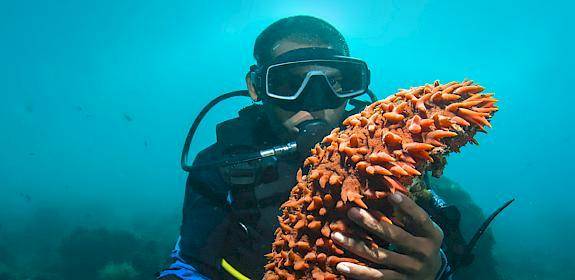Trans-boundary conservation measures for Argali needed
Vilm, Germany, March 2012—Key conservation stakeholders from Central Asia agreed to improve co-operation for the trans-boundary management of Argali at a meeting recently concluded on the German island of Vilm.

Representatives of governmental agencies, hunting companies, scientific institutions and NGOs from Afghanistan, Kazakhstan, Kyrgyzstan, Mongolia, the Russian Federation, Tajikistan and Uzbekistan met from 22nd to 26th March 2012 to discuss ways to ensure the conservation and sustainable use of Argali.
The Argali or Mountain Sheep Ovis ammon is a threatened ungulate that inhabits mountains, steppe valleys and rocky outcrops in eleven Central Asian countries.
Across its range the Argali is Near-Threatened by pressures relating to livestock grazing, habitat loss, unsustainable hunting and poaching, while habitat degradation, extraction of mineral resources, linear infrastructure and border fences disturb their migration routes.
The impressive horns of adult males make them particularly valued and prized by trophy hunters.
Community-based trophy hunting schemes where significant shares of the revenues from trophy fees are allocated to communities to stimulate conservation activities and local development, can offer strong incentives for conservation. Requirements and ways to promote sustainable and community-based management were therefore at the centre of the debate.
Speakers included Alexey Vaisman from TRAFFIC, plus representatives from the Wildlife Conservation Society (WCS), Denver Zoological Foundation, the International Council for Game and Wildlife Conservation (CIC), GIZ, the Food and Agriculture Organization (FAO) and the Convention on Migratory Species (CMS) who provided insight into good international practices for wildlife conservation such as the development of economic incentives to improve the involvement of local communities, as well as appropriate ways to organize regional co-operation.
Participants unanimously agreed on the need for improved international co-operation to address issues such as monitoring border fences, illegal trade and cross-border poaching. Data collection, information exchange and good practices on the conservation and sustainable use of Argali were particularly highlighted. In order to co-ordinate conservation actions at a national level, participants began developing an International Action Plan for conservation of the Argali.
The meeting was co-organized by the German Federal Agency for Nature Conservation (BfN) and the Deutsche Gesellschaft für Internationale Zusammenarbeit (the German Society for International Cooperation – GIZ) in collaboration with CMS. GIZ is implementing a Program on Sustainable Use of Natural Resources in Central Asia on behalf of the German Federal Ministry for Economic Cooperation and Development (BMZ) in some of the range states.




